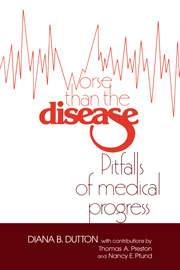Book contents
- Frontmatter
- Contents
- List of contributors
- Preface
- Acknowledgements
- List of abbreviations
- Part I Overview
- Part II Four case studies
- Part III Lessons, questions, and challenges
- 7 Risks and rights
- 8 Compensating the injuries of medical innovation
- 9 What is fair? Medical innovation and justice
- 10 The role of the public
- 11 What is possible? Toward medical progress in the public interest
- Notes
- Index
11 - What is possible? Toward medical progress in the public interest
Published online by Cambridge University Press: 05 May 2010
- Frontmatter
- Contents
- List of contributors
- Preface
- Acknowledgements
- List of abbreviations
- Part I Overview
- Part II Four case studies
- Part III Lessons, questions, and challenges
- 7 Risks and rights
- 8 Compensating the injuries of medical innovation
- 9 What is fair? Medical innovation and justice
- 10 The role of the public
- 11 What is possible? Toward medical progress in the public interest
- Notes
- Index
Summary
Medical innovation directly and intimately affects whether and how we live, and when and how we die. Research has unlocked technical capabilities that defy the imagination, and will continue to do so. With genetic engineering, scientists may leave their mark on the genetic heritage of the entire planet. Yet, as the case studies in this book document, we who use medicine's innovations, who bear their risks, and who, both as taxpayers and as consumers, pay for the products and the research that made them possible, have little if anything to say about the nature and pace of medical progress.
This book argues for an end to that exclusion; this chapter suggests the kinds of changes that might bring it about. It draws together many of the themes and issues that have been discussed throughout the book, looking at the lessons that can be learned and how they apply to present and future policies in the United States. These lessons become all the more urgent in light of medicine's deepening dilemmas and the failure of present policies to resolve them.
It is perhaps useful to stress again, as we did at the book's outset, that the four case studies were chosen to illuminate some of the major dilemmas posed by contemporary medicine. Although questions of costs, risks, efficacy, and equity are clearly of widespread concern, we do not intend to suggest that all medical innovations will encounter exactly the same types of problems as occurred in the four cases.
- Type
- Chapter
- Information
- Worse than the DiseasePitfalls of Medical Progress, pp. 350 - 382Publisher: Cambridge University PressPrint publication year: 1988



